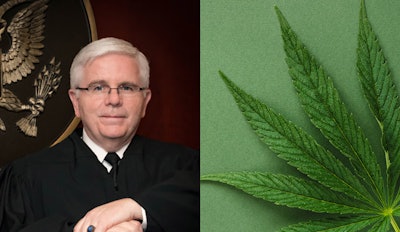
The Drug Enforcement Administration (DEA) won’t issue a final rule on cannabis rescheduling until after a new president is sworn into office.
While the DEA named 25 participants on Oct. 28—the full list is provided below—to participate in an administrative law judge hearing to review the merits of a proposed rule, those participants will not testify until 2025, further delaying the process.
DEA Administrator Anne Milgram designated Department of Justice (DOJ) Chief Administrative Law Judge (ALJ) John J. Mulrooney II this week to preside over the hearing that she granted in August and initially announced would begin on Dec. 2.
This hearing is to help the DEA determine its views as to the appropriate schedule for cannabis before issuing a final rule to possibly reclassify the plant under the Controlled Substances Act (CSA). This comes after the DOJ issued a notice of proposed rulemaking (NPRM) on May 21 to transfer cannabis from Schedule I to Schedule III under the CSA. The DEA holds final authority.
However, while Milgram provided Mulrooney with a list of 25 participants for the hearing—including industry groups, lawyers, doctors, state regulators, veteran groups, elected figures and prohibitionists—Mulrooney issued a preliminary order on Oct. 31 that “no testimony or other evidence will be received” at the preliminary hearing on Dec. 2.
Instead, because Milgram’s list did not provide how each of the 25 participants would be “adversely affected or aggrieved” by cannabis rescheduling, nor their stances on the proposed rule, Mulrooney indicated that hearing testimonies won’t begin until January or February.
“Although the Participant Letter designated a list of enumerated entities and individuals as [designated participants], there is no indication in the four corners of the document as to whether the ‘participants’ support or oppose the NPRM or how the ‘participants’ satisfy the ‘interested person’ definition set forth in the regulations,” Mulrooney wrote in the Oct. 31 order.
This latest delay in the rescheduling process pushes the DEA’s final rule beyond the current White House Administration, an uncertainty that many industry stakeholders had hoped to avoid.
However, Democratic presidential candidate Kamala Harris and GOP candidate Donald Trump have both indicated support for federal cannabis rescheduling in the leadup to the 2024 election.
David Culver, head of policy for the U.S. Cannabis Council, an industry advocacy group, said in a statement provided to Cannabis Business Times that a changing of the guards in the Oval Office won’t stop cannabis from being rescheduled.
“While we’re disappointed to see a potential delay, we remain confident in the process,” he said. “The debate around this is over with both leading presidential candidates embracing rescheduling—the policy and the politics are aligned; it’s now only a matter of time.”
President Joe Biden initiated the rescheduling process in October 2022 when he directed his cabinet to review the plant’s classification. The U.S. Department of Health and Human Services (HHS) recommended to the DEA in August 2023 that cannabis be relisted to Schedule III after conducting a scientific and medical evaluation for cannabis that determined cannabis has “currently accepted medical use” in the U.S. and, therefore, doesn’t belong alongside Schedule I substances like heroin, LSD and ecstasy.
While the HHS recommendation led to the DOJ’s proposed rule in May, which drew more than 43,000 comments during a 60-day public comment period, the DEA has maintained that it has yet to decide “as to its views of the appropriate schedule for marijuana.” In part, that’s what the ALJ hearing will provide—evidence for the DEA to issue its final rule.
Milgram granted the ALJ hearing in August, scheduling it to begin on Dec. 2 to “receive factual evidence and expert opinion regarding” the DOJ’s proposal for a Schedule III listing. Although Milgram’s decision to grant the hearing pushed a final rule beyond the 2024 presidential election, her decision could help provide the DEA with a defense against potential litigation intended to block the implementation of a final rule.
RELATED: Rescheduling Update: How Long Is the Wait? What’s Next?
However, as the acting administrative law judge presiding over the forthcoming hearing, Mulrooney called into question this week whether each individual or organization on Milgram’s 25-participant list meets the “interested person” eligibility criteria.
“The record currently contains no hearing requests, notices of appearance, or correspondence between the [DEA] and the Designated Participants or those who sought that status,” he wrote. “As the record currently stands, although the [DEA] has fixed a December 2, 2024, hearing date, there is no way to discern from the present record which [designated participants] support or oppose the NPRM. To effectively preside over this hearing, additional information must be furnished to the tribunal forthwith.”
Accordingly, Mulrooney ordered that any designated participant file a brief notice by Nov. 12 that will include the following information/document(s):
(1) the name, address, phone number, and general nature/principal mission of the DP’s practice, profession, or business;
(2) a notice of appearance for the counsel(s) of record that will be representing the DP at the hearing;
(3) the date that a request for hearing and/or participation was properly filed by the DP with the DEA;
(4) why/how the DP would be sufficiently “adversely affected or aggrieved” by the proposed scheduling action to qualify as an “interested person” under the regulations;
(5) whether the DP supports or opposes the rescheduling action the DEA seeks in its NPRM; and
(6) any known conflicts of interest with DEA or DOJ leadership or personnel that may require disclosure.
In addition, Mulrooney plans to commence preliminary hearing proceedings at 9:30 a.m. on Dec. 2 in Arlington, Va., where the designated participants will offer their availability dates in January and February regarding their counsel and any witnesses they seek to present when the hearing’s testimonial proceedings begin next year.
Also to note, Milgram will allow the hearings to be live-streamed and is granting the in-person attendance of a limited number of credentialed media members, as determined by the DEA’s Office of Public Affairs.
“Given the public interest in this matter and DEA’s commitment to conducting a transparent proceeding, I am exercising my inherent authority under [the Code of Federal Regulations] to waive 21 CFR 1316.52 to the extent necessary to direct that the hearing be live-streamed,” she wrote in the Oct. 28 letter to Mulrooney.
Below is the list of 25 participants Milgram named for the hearing:
- Village Farms International, represented by Shane Pennington of Porter Wright
- National Cannabis Industry Association, represented by CEO Aaron Smith and Director of Government Relations Michelle Rutter Friberg
- American Academy of Hospice and Palliative Medicine, represented by Dr. Chad Kollas
- Cannabis Biosciences International Holdings, represented by Director and Treasurer John Jones
- Hemp for Victory, represented by Robert Head, Dr. Corey Burchman, Dr. Darinia Douchi and Victor Bohm
- State of Connecticut Office of Cannabis Ombudsman, represented by Erin Gorman Kirk
- Massachusetts Cannabis Advisory Board, represented by Research Subcommittee Chair Ellen Brown
- Veterans Initiative 22, represented by Executive Director Shanetha Lewis
- The Doc App (d/b/a My Florida Green), represented by President and CEO Nicholas Garulay and in-house counsel Jason Castro.
- The Commonwealth Project, represented by Katy Green
- St. Michael’s College, represented by Psychology Professor Ari Kirshenbaum
- National Drug and Alcohol Screening Association, represented by Jo McGuire
- Smart Approaches to Marijuana, represented by Patrick Philbin
- International Academy on the Science and Impact of Cannabis, represented by Roneet Lev
- Cannabis Industry Victims Educating Litigators, represented by Senior Counsel David Evans
- Dr. Kenneth Finn (of Colorado Pain Institute)
- National Transportation Safety Board, represented by Chair Jennifer Homendy
- Phillip Drum, Pharm D.
- State of Nebraska, represented by Attorney General Mike Hilgers
- International Association of the Chiefs of Police
- Drug Enforcement Administration of Federal Narcotics Agents, represented by Agent in Charge Marshall Fisher
- American College of Occupational and Environmental Medicine, represented by Natalie P. Hartenbaum
- Community Anti-Drug Coalitions of America, represented by Public Policy Consultant Sue Thau
- Tennessee Bureau of Investigation, represented by Kim Litman
- National Sheriffs’ Association, represented by Director of Government Affairs Yesim Karaman and Collin County Sheriff Jim Skinner (Texas)



























